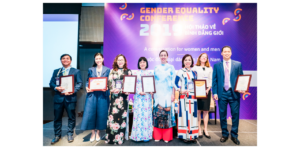Top executives and decision-makers from the private sector, members of the academe, gender experts and stakeholders convened in Ho Chi Minh City on 22 October for the Gender Equality Conference.
Organised by the Australian Consulate-General in Vietnam, the conference, themed “A Conversation for Women and Men,” was an opportunity for participants to openly discuss pressing gender equality issues in Vietnam.
In her opening speech, Consul-General Julianne Cowley said that women’s empowerment is a key focus of diplomatic relations between Australia and Vietnam. She also emphasised the importance of gender equality in uplifting the Vietnamese economy.
“Gender equality is crucial to reinforce Vietnam’s economic dynamism and ensure its future prosperity,” Consul-General Cowley said. To support her statement, she cited a study by the McKinsey Global Institute, which suggests gender equality can add AU$58.24 billion to Vietnam’s annual Gross Domestic Product (GDP) by 2025.

A panel pledge to challenge the status quo
Consul-General Cowley and Investing in Women (IW) CEO Julia Newton-Howes led the ceremonial awarding of EDGE Certifications to Vietnamese Business Coalition for Women’s Empowerment (VBCWE) member firms.
The Economic Dividends for Gender Equality (EDGE) Certification is the leading global assessment methodology and business certification standard for gender equality. It helps organisations by creating workplaces that are not only optimal for both women and men, but that also increase productivity, employee retention and profitability in the long run.
Leaders from these firms were also among the 15 male CEOs who signed the Panel Pledge, acknowledging the lack of female speakers in high-profile conferences and events and signifying their commitment to ensure gender-equal representation in public forums.
“By signing the Vietnam Panel Pledge, business leaders will take active steps to involve more women and women’s leadership in their organisations,” said Consul-General Cowley.

Male CEOs signed the Panel Pledge to signify their commitment to gender-equal representation
Workplace gender equality and gender norms
Workplace gender equality (WGE) drives positive impact on both employees and businesses. Madam Ha Thu Thanh, Chair of Deloitte Vietnam and VBCWE pointed out the benefits of advancing WGE.
“By having gender equality in all employment opportunities, companies attract and retain talent. In return, the employees improve productivity and business efficiency,” she said.
Maritime Bank CEO Huynh Buu Quang stressed the crucial role of gender parity in a company’s operations. Policies focused on gender parity encourages competitiveness in employees, attracts and retains employees, and promotes good corporate culture.
VBCWE Vice-Chair and Ho Chi Minh City Peace and Development Foundation President Madam Ton Nu Thi Ninh, also talked about the negative impact of holding on to gender norms, particularly in Vietnam.
“Constant upholding of the so-called traditional virtues and roles tend to result in women often becoming hostage to their own gilded castles,” said Madam Ninh.
Gender equality and women empowerment are not simply good to have—but a must—to attaining sustainable development in Vietnam, she added.
Shifting gender stereotypes
IW Vietnam County Manager Binh Dang presented the results of IW’s Social Norms, Attitudes and Practices (SNAP) Survey during the session on “Shifting gender stereotypes towards a modern Vietnam workforce.”
The SNAP findings highlighted emerging shifts in urban millennial perceptions around women’s and men’s roles in the country.
Dr. Khuat Thu Hong, Executive Director of the Institute for Social Development Studies (ISDS), shared her reflections on the status of gender stereotypes in Vietnam.
“Vietnam has made progress on gender equality. Women are keen to attain higher education, are among the top leaders of the country and account for about half of the national labour force,” she said.
“However, social pressures prevent women from pursuing education and career growth. Gender inequality in Vietnam is underpinned by traditional perceptions or attitudes towards men’s and women’s values and roles. The role of family caregiver, in particular, is exclusively assigned to women.”
But Dr. Hong is hopeful. Research shows that there are emerging signs of more equal relationships—with more men and women from the younger generation sharing care work at home and exhibiting more equitable gender attitudes.
Dr Hong moderated a panel discussion with Dung Le, Care Vietnam Country Director; Tram Ho, CEO of Dream Viet Education (Kyna) and Nguyen Ngoc My, Board Director of Alphanam Group.
The panel members shared their experiences of the impacts of stereotypes as entrepreneurs, as business leaders and as community leaders. They also enumerated barriers and opportunities that stereotypes pose for Vietnam’s workforce.

L-R: Dr. Khuat Thu Hong, ISDS Executive Director; Tram Ho, CEO of Dream Viet Education; Nguyen Ngoc My, Alphanam Group Board Director; Dung Le, Care Vietnam Country Director
Panellists highlighted the growing awareness of the barriers to gender equality in terms of job segregation, promotion of women to leadership and the impacts of the pressure on women to fulfil their roles as good wives and mothers. There was also a consensus on the need to engage men in the conversation on gender equality, and this opened the opportunity for both women and men to discuss the role of men at home.
Participants likewise recognised the private sector’s role in perpetuating or shifting gender norms through advertising—a concern that business owners, advertising bureaus and the media can address.
All photos provided by the Australian Department of Foreign Affairs and Trade.
Want to learn more about Investing in Women’s efforts to promote workplace gender equality? Follow this link.

